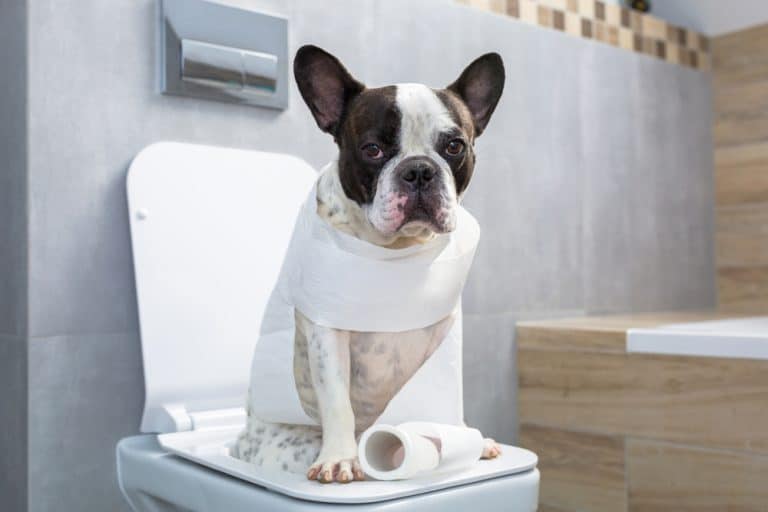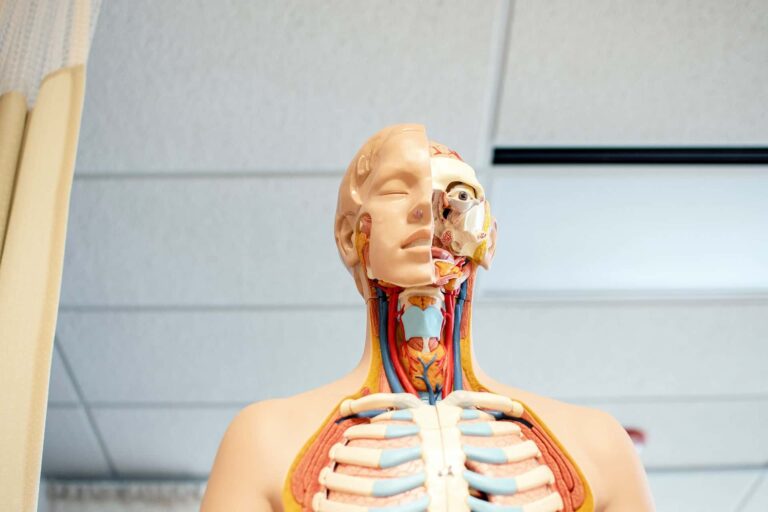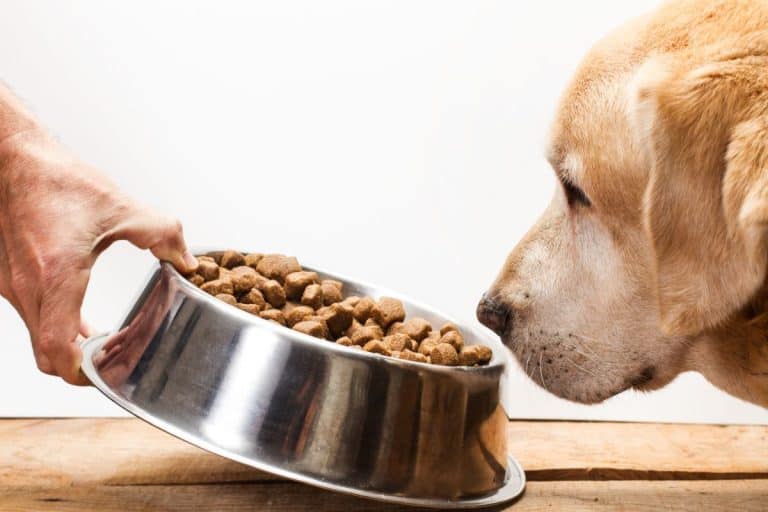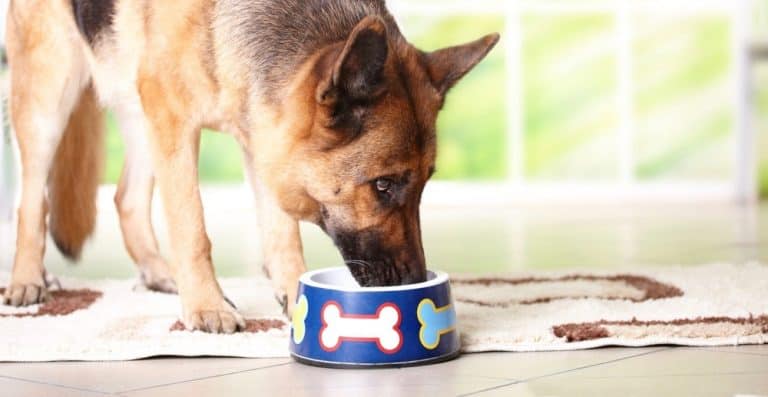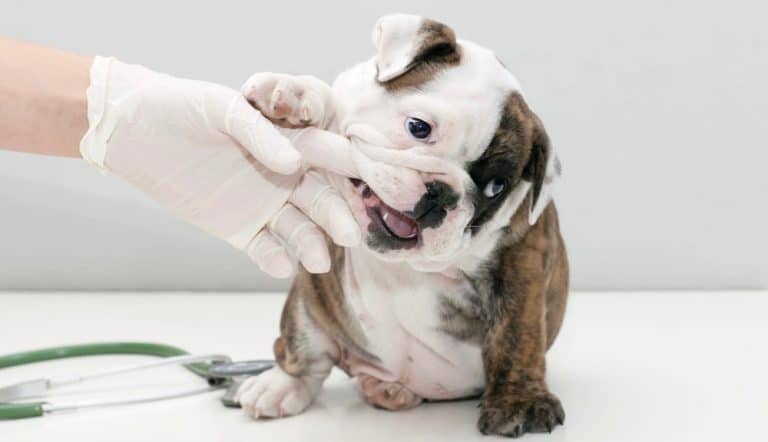Why Does My Dog Smell Like Metal (Dog’s Breath Smells Like Iron)
Dogs have a particular smell whether they are groomed or not. As a dog owner, you may grow accustomed to these smells as you play and bond with your dog.
However, some people have an experience that leaves them wondering, “why does my dog smell like metal?”
It is not uncommon for dogs to harbor unpleasant smells that they have picked up while playing or just being their normal selves.
As people who spend time around dogs, we make allowances for them. But certain smells like the smell of metal can be due to a health condition that deserves your attention.
This is not a common smell that should be brushed off as nothing serious. In a case like this, quick diagnosis and treatment are crucial, therefore you need to take action immediately.
There are several reasons why your dog could have this iron or metallic smell. They all stem from a variety of health problems.
To help you navigate this issue we have compiled a detailed guide that will inform you of the signs that you should look for as well as a few ways you can treat the issue.
Because this can potentially be a serious health problem we have included veterinary advice along with our recommendation.
What Should I Do If My Dog Smells Like Iron?
Remember that dogs cannot let you know when their body feels different or if they have a health issue. You have to look for the signs.
Having a bad metallic smell is one of the clear signs of a health condition that has been previously ignored.
Unless you deal with this problem directly, it will only get worse. On your own, it may be a task to uncover the reason for the metallic smell.
However, with the right knowledge, you would be able to see the signs and understand what is happening.
If all else fails you need to have your dog examined by a veterinarian who will run a series of tests and pinpoint the problem.
There are 4 main have problems that could be responsible for your dog’s strange smell.
These are because of dental issues, kidney problems, internal bleeding, and anal gland impaction. Anal gland impaction is the most common reason for a metal smell.
What Are The Anal Glands In Dogs?
Before we explain the four main causes of a metallic smell in dogs we must explain what anal glands are because anal gland impaction is one of the more common issues that occur.
For dogs, anal glands or sacs are small glands shaped like kidneys and located on each side of a dog’s anus. It can be found between the external anal sphincter and the smooth rectal muscle.
The anal sac is lined with specific cells that contain several sweat glands and oil. These cells are responsible for that metal smell.
What’s The Purpose Of Anal Sacs?
Dogs mark their territory with their unique and personal odor found in their urine or poop. They also sniff others’ backsides to communicate.
For example, when one dog sniffs another dog, they can figure out if they are friends or foes along with their future relationship.
A dog’s anal glands are what generate his unique smell. You can think of it as a canine fingerprint.
Reasons My Dog Smells Like Iron
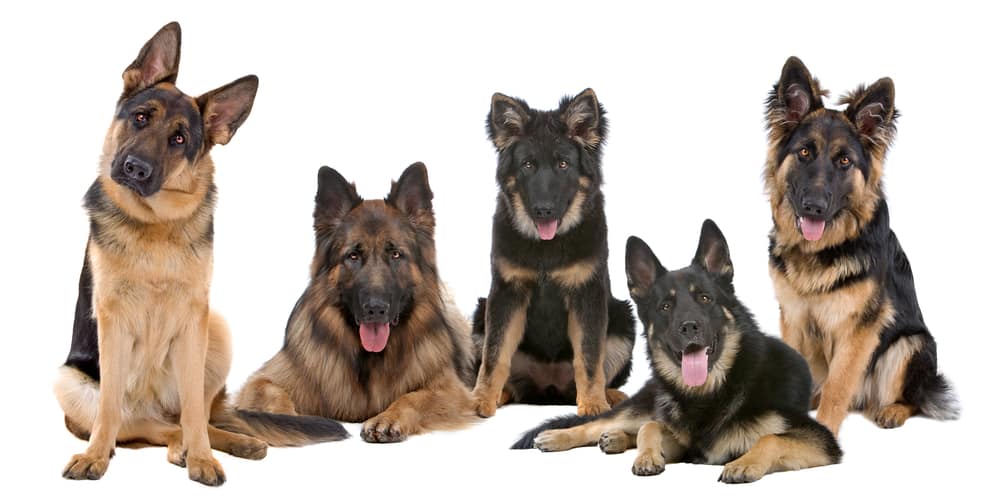
Kidney Problems
Just like with humans, your dog’s kidneys are critical to his health so damage to it can be fatal.
The kidneys are responsible for removing toxins and waste from the body so that these harmful substances cannot continue to circulate in the bloodstream.
If these waste materials are allowed to circulate in the bloodstream they can do considerable damage to the organs and cells.
Kidney failure can lead to several other serious health conditions in your dog like the buildup of iron and other heavy metals.
This build-up can cause your dog’s breath to smell like metal. Hence, your dog’s metallic-smelling breath is simply a symptom of a greater issue which is problems with his kidney.
That said, you can expect more than just a metallic breath. These are a few other symptoms of kidney problems in your dog:
Breathing difficulty – In the late phases of kidney disease, your dog may have trouble breathing because of toxin build-up.
Frequent urination – Your dog may have a frequent and urgent need to urinate since the body will attempt to channel more water to the kidneys. You may notice your dog urinating in his usual place a lot more.
Lethargy – Your dog may become increasingly depressed and inactive and the kidney disease gets worse. His usual energy and vitality may disappear.
Excessive thirst – Because the toxins are more prominent in the body, your dog will become more dehydrated.
This is because the damaged kidneys are not doing a very good job of purifying the blood. Your body responds by directing more water toward them to assist.
Understand that if your dog suffers from any of the above symptoms along with a metallic-smelling breath you should ensure that he sees a veterinarian as soon as possible because it’s may mean problems with the kidneys.
Your veterinarian may be able to treat the problem if it is caught early enough and diagnosed. The main treatments include medication and dialysis.
Dental Issues
In severe cases, your dog’s dental issues may lead to his breath having a metallic smell.
When you smell your dog’s bad breath, it may have a particularly distinct metallic smell because of canine periodontal disease. It is also called gingivitis or gum disease in dogs.
This happens when your dog has plaque build-up which contains bacteria that is harmful to his body.
These bacteria destroy the teeth and gums over time causing painful sores in the gums and bad dog breath. In severe cases, you may notice that your dog’s gums are bleeding.
The metallic smell usually comes from the bleeding gums that happen because of gum disease.
Anyone who has encountered blood knows that it smells metallic and coppery. So if your dog’s mouth is bleeding then you are likely to smell the metal.
The good news is, this can be prevented with proper dental care. Oral health in dogs is often overlooked when it comes to their grooming.
You should brush your dog’s teeth frequently and also give him dental chews. Some people prefer to add tooth health droplets to their dog’s water which reduces the likelihood of dental disease and gingivitis.
Keep in mind that dental care is a part of overall health care for your dog. This is because oral health affects overall health since the gums and teeth are connected to the bloodstream.
Gum and teeth infections can travel throughout the bloodstream causing other diseases.
Internal Bleeding
This is a problem that can be potentially very serious boy dog. Sometimes your dog may be playing or exercising the way he usually does and sustained an injury.
Even though this injury does not display itself on the outside it can still cause a lot of damage as internal bleeding.
Your dog may not be able to tell you what is happening with their bodies, but the internal bleeding may have happened because of some accident of which you are unaware, or an underlying medical condition.
If you notice that your dog has a metallic-smelling breath and has also been in an accident or tussle with another dog then it could mean that he is suffering from internal bleeding.
Your dog needs medical attention as soon as possible if this is the case. Early diagnosis and treatment are crucial.
Anal Gland Impaction
Anal gland impaction is the most popular reason for the metallic smell of your dog’s breath. Your dog has anal glands that are shaped like a kidney.
They are also called anal sacs. You can find them on either side of his anus. whenever your dog defecate these sense glands are activated This is the usual way that your dog uses to mark his territory.
These glands are usually not a problem because whenever your dog uses the bathroom it is emptied. But on some occasions, the glands become impacted.
When they are impacted it causes fluid buildup so that has a noticeably protrude. They also create a strong and unpleasant odor that many describe as fish and metal.
Anal gland impaction tends to affect smaller dog breeds such as Pomeranians and Chihuahuas. The chances of a small breed dog developing the condition are even greater if he is overweight.
There are a few symptoms you can look for such as blood in your dog’s feces, unwillingness to sit down, and an overwhelming urge to lick his behind. These are all signs that your dog is in pain and suffering from anal gland impaction.
Fortunately, this is a treatable condition so by visiting your veterinarian who would make a proper diagnosis, you will be able to get treatment for your dog.
If there is an infection, the vet will prescribe antibiotics, but he will have to deal with the anal gland impaction manually.
Why Does Your Dog’s Anal Gland Get Impacted?
There are a few risk factors of anal gland impaction. Be sure to reduce the amounts of risk factors if you want to prevent this serious condition. This is especially true if you have a small or toy breed dog. These are:
- Diarrhea
- Obesity
- Yeast or bacterial skin infections
- Blockage caused by muscle tumor or inflammation
- Skin mites
- Physical abnormalities
- Food allergies
Older dogs who have compromised mobility because of joint inflammation or arthritis may also develop anal gland impaction.
This is partly due to older dogs straining to poop. This causes the anal sacs to be expressed and so the anal sacs do not empty. There is waste matter trapped inside which thickens causing the glands to swell.
How Do I Prevent Anal Gland Impaction In My Dog?
Some dogs have physical abnormalities that hinder them from draining their anal sacs properly when they poop.
Unless your dog has such an abnormality there are two main ways you can prevent anal gland impaction.
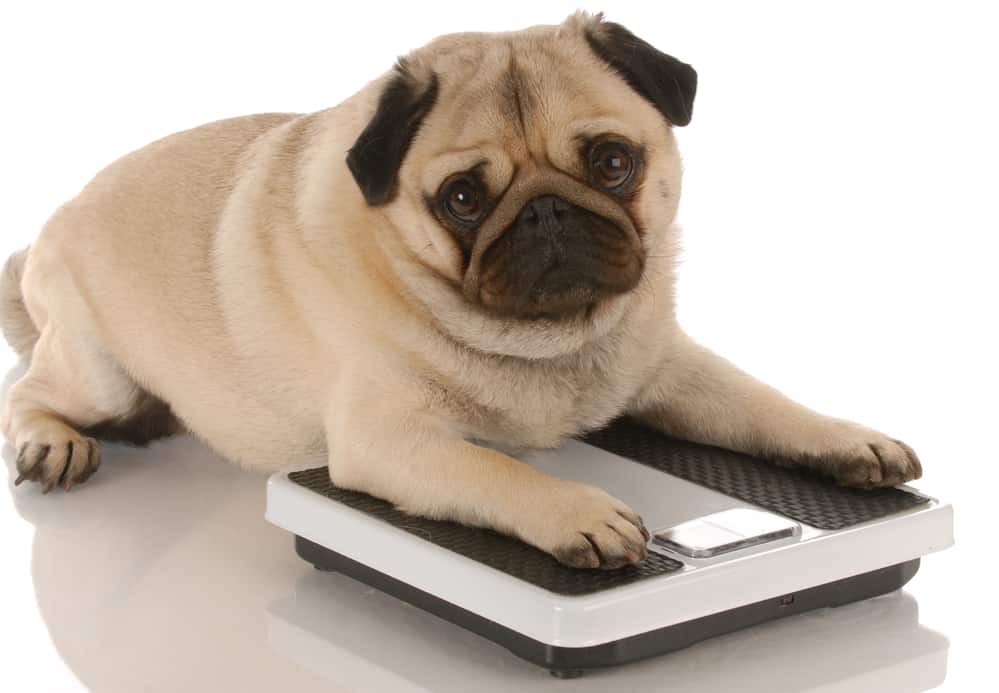
Lose Weight
Your dog needs to lose weight if he is overweight. This can be done over time through a strict exercise regimen and eating schedule. You can discuss this with your veterinarian to ensure that the weight loss is conducted healthily.
This is very important as obesity can prevent many health risks to your dog. Anal gland impaction is preventable because fat dogs are more likely to develop anal gland compaction.
Obesity also leaves your dog at risk for heart problems, joint conditions, and diabetes. Not to mention dogs with brachycephalic breeds who also develop breathing problems that affect their health.
Balanced & Nutritious Diet
There are dog breeds such as Goldendoodles who have a higher likelihood of developing diarrhea and food sensitivity.
Dogs who usually have loose stools and upset stomachs have a higher likelihood of developing anal gland impaction than dogs who have normal bowel movements.
This is why it is of utmost importance to give your dog a nutritious and balanced diet. This should contain high amounts of protein and fiber for improved gut health. There are also a few supplements that can assist so consult your veterinarian
Ways To Treat Anal Impaction?
Expressing Procedure
Some people have been successful and expressing their dog’s anal glands at home but visiting your veterinarian is a much safer way.
A medical professional will know what to do if something goes wrong while performing the procedure.
The same goes for dog groomers who offer anal gland expressions as part of their service.
Remember that the dog groomers may not be qualified veterinarians and may not be able to deal with complications during the procedure. This is not recommended.
Because the procedure also puts your dog at risk for further inflammation, it should be handled by a qualified and licensed medical professional.
The procedure in itself is quite delicate, but it is simple. One just squeezes the glands in a milking fashion. The fluid is released from your dog and pressure is taken off of the glands
Your dog will feel a greater sense of ease when the fluid is removed. Some dogs may scoot their behinds on the floor when the procedure is complete, but they usually do not do this for long.
Even though the procedure is easy, it is much better if all safety precautions are followed for the sake of your dog.
Prevention
Even though you can express the anal glands which provide a bit of relief, this should not be a procedure that is relied upon permanently.
The better way of treatment would be to prevent the condition in the first place as they put a lot of unnecessary strain and stress on your dog. You should look carefully at smaller breeds to make sure this problem does not occur.
Reach out to your veterinarian and discuss a plan of action to prevent this issue. Diet and exercise is the main way to avoid this condition.
Although some dogs have a predisposition or physical abnormalities that give birth to this condition, and diet and exercise will still help. Healthy digestion is critical in preventing this condition so probiotics and fiber will go a long way.
Early Diagnosis
Early diagnosis can save your dog’s life. Thus, constantly monitor your dog for the signs and symptoms of anal gland impaction especially if they are high risk.
Whenever you bond with your dog and detect a metallic smell, act quickly and consult your veterinarian to rectify the issue.
Final Words
Anal sacs are usually emptied whenever your dog has a bowel movement. The problem arises when the anal sacs are not emptied, so they become impacted.
This is when you get that iron smell from them. Over time, the anal glands and the metallic smell are stronger.
Your dog is also more uncomfortable. This situation could get worse because the anal sac can rupture which is very painful for your dog.


